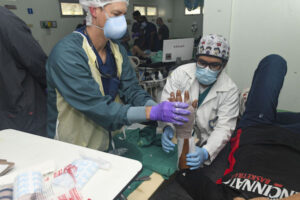
Story by Petty Officer 2nd Class Justin Woods
Naval Medical Center Camp Lejeune
SAN PEDRO SULA, Honduras – A Honduran man injured in an accident regained motion in his left index finger after two surgeons with Expeditionary Medical Unit (EMU) 10 G-Rotation 16 provided trauma care during a Global Health Engagement (GHE) at Hospital Nacional Mario Catarino Rivas.
On Feb. 27, 2024, U.S. Navy Capt. Bradley Deafenbaugh, an orthopedic surgeon with Navy Medicine Readiness and Training Command (NRTMC) Portsmouth, and Capt. Jamie Fitch, a general surgeon with (NMRTC) Camp Lejeune, conducted an operation reconnecting 19-year-old Renaldo Muñoz severed tendon. Muñoz was injured in a work-related incident one week prior, which resulted in the immobilization of his finger.
“I was at work and accidently cut my hand with a machete. We came to the hospital, and they gave me first response treatment,” explained Muñoz. “About half an hour after I was discharged, I realized my finger wasn’t moving. I thought it was just too swollen to move, but the next day I got worried.”
Muñoz came back to the hospital where Capt. Fitch scheduled an appointment with the EMU orthopedist to operate.
“Repairs of this kind are generally done by plastic surgery at their hospital,” Fitch said. “But because there is only one plastic surgeon, I was told he may have to wait several months to have the tendon repaired. Instead, we placed a splint on his hand to maintain neutral position and asked him to come back on Tuesday.”
After the successful operation performed by Deafenbaugh and Fitch, Muñoz had mobility in his index finger again.
“The specific injury was an index finger extensor tendon laceration, which we repaired,” added Deafenbaugh. “His recovery time should be about three months.”
Muñoz expressed his gratitude toward the EMU surgeons for being able to care for him so quickly.
“I’m glad the doctors were able to fix my finger,” he said. “Now that the operation is finished, I want to recover completely so I can get back to work.”
EMU 10 G conducted its first GHE to enhance expeditionary core skills and knowledge exchange with Honduran healthcare professionals in a limited resource environment, Feb. 17-March 2, 2024. EMUs consist of health services and support personnel, and contains deployable medical materiel configured to provide flexible, modular, and scalable forward resuscitative care capabilities.
Navy Medicine — represented by more than 44,000 highly-trained military and civilian health care professionals — provides enduring expeditionary medical support to the
warfighter on, below, and above the sea, and ashore.